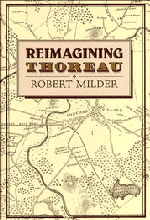2 - “Under the Eyelids of Time”: A Week on the Concord and Merrimack Rivers
Published online by Cambridge University Press: 05 November 2011
Summary
[In Romantic literature] the yearning for fulfillment is sometimes expressed as Heimweh, the homesickness for the father or mother or for the lost sheltered place.
M. H. AbramsBased on Thoreau's 1839 expedition with his brother, John, A Week on the Concord and Merrimack Rivers began to assume the mental contours of a book sometime after John's death in 1842, the year Thoreau wrote “A Walk to Wachusett.” The chronology seems more than coincidental not only because both works are literary excursions but because both draw their energy from Thoreau's search for an imaginatively habitable alternative to Concord. “Wachusett” pursues its quest on land and across space, A Week chiefly on water and through time, yet both have as their physical destination a mountain in the distance and as their spiritual destination a mode of being more distant yet. Drafted in 1845 and revised at least twice before its publication four years later, A Week overlaps the early versions of Walden but is a more youthful work in its retrospective focus, its incorporation of earlier and sometimes outgrown material, and its dreamy, elegiac stance toward experience. It is also a book singularly resistant to interpretive coherence. If its first draft is imaginatively thin and underwritten, its final one is dense with samplings from Thoreau's published and unpublished works, much to the prejudice of a clear narrative or thematic line.
- Type
- Chapter
- Information
- Reimagining Thoreau , pp. 29 - 46Publisher: Cambridge University PressPrint publication year: 1995



